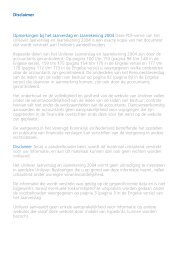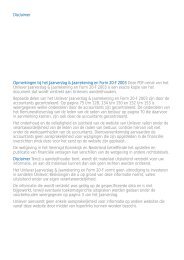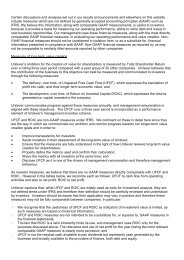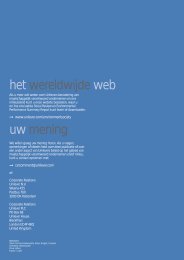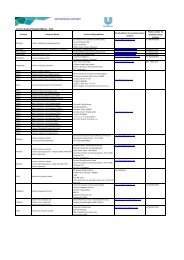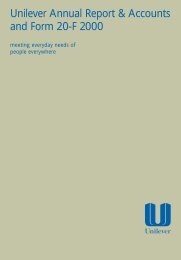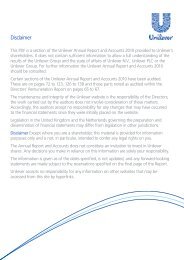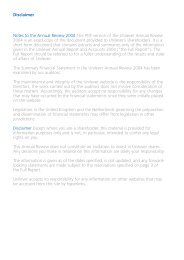Meeting everyday needs of people everywhere - Unilever
Meeting everyday needs of people everywhere - Unilever
Meeting everyday needs of people everywhere - Unilever
Create successful ePaper yourself
Turn your PDF publications into a flip-book with our unique Google optimized e-Paper software.
Corporate governance<br />
contribution during the past seven years, particularly while<br />
a member <strong>of</strong> the Nomination and Remuneration<br />
Committees.<br />
The Rt Hon The Lord Brittan <strong>of</strong> Spennithorne QC<br />
was appointed as an Advisory Director with effect from<br />
1 May 2000 until the Annual General <strong>Meeting</strong>s in 2003.<br />
Lord Brittan was a member <strong>of</strong> the UK Government, as<br />
Home Secretary and as Secretary <strong>of</strong> State for Trade and<br />
Industry, and, between 1989 and 1999, <strong>of</strong> the European<br />
Commission, where he became a Vice-President,<br />
his responsibilities having included competition and<br />
trade policy.<br />
The Boards have resolved to re-appoint Mr Bertrand<br />
Collomb as an Advisory Director, also until the Annual<br />
General <strong>Meeting</strong>s in 2003.<br />
Sir Brian Hayes and Lord Wright <strong>of</strong> Richmond retired<br />
at the Annual General <strong>Meeting</strong>s on 4 May 1999.<br />
Requirements in the Netherlands and the UK<br />
A vital factor in the arrangements between NV and PLC<br />
is their having the same directors. As the concept <strong>of</strong> the<br />
non-executive director, as recognised in the United<br />
Kingdom, is not a feature <strong>of</strong> corporate governance in the<br />
Netherlands, and the Supervisory Board, as recognised in<br />
the Netherlands, is unknown in the United Kingdom, it is<br />
not practicable to appoint supervisory or non-executive<br />
directors who could serve on both Boards. However, a<br />
strong independent element has long been provided by<br />
<strong>Unilever</strong>’s Advisory Directors, who perform many <strong>of</strong> the<br />
functions <strong>of</strong> supervisory and non-executive directors.<br />
The Audit, External Affairs and Corporate Relations and<br />
Remuneration Committees consist exclusively <strong>of</strong> Advisory<br />
Directors and the majority <strong>of</strong> the members <strong>of</strong> the<br />
Nomination Committee are Advisory Directors. See page<br />
44 for details.<br />
The Committee on Corporate Governance in the<br />
Netherlands issued its report ‘Recommendations on<br />
Corporate Governance in the Netherlands’ in 1997.<br />
NV applies the Committee’s recommendations for<br />
supervisory directors to its Advisory Directors in so far<br />
as these are in line with their specific role within <strong>Unilever</strong>.<br />
NV complies with all other recommendations <strong>of</strong> the<br />
Committee, except that the Board <strong>of</strong> Directors takes the<br />
view that requests for an item to be placed on the agenda<br />
for a shareholders’ meeting must be supported by more<br />
than an insignificant proportion <strong>of</strong> the shareholders and<br />
will therefore only accept requests from a shareholder or<br />
group <strong>of</strong> shareholders holding at least 1% <strong>of</strong> the voting<br />
rights attaching to the issued share capital <strong>of</strong> NV. Requests<br />
must be submitted, at the latest, 60 days prior to the date<br />
<strong>of</strong> the meeting.<br />
PLC is required, as a company that is incorporated in the<br />
United Kingdom and listed on the London Stock<br />
Exchange, to state how it has applied the principles and<br />
how far it has complied with the provisions set out in<br />
Section 1 <strong>of</strong> the Combined Code (‘the Code’) appended<br />
to the Listing Rules <strong>of</strong> the London Stock Exchange.<br />
As already explained, the Boards control the Company<br />
through the Executive Committee. Responsibilities are<br />
s h a red by the Chairmen <strong>of</strong> NV and PLC, while the Advisory<br />
D i rectors perform many <strong>of</strong> the functions <strong>of</strong> the supervisory<br />
board members or non-executive directors, although they<br />
are not formally members <strong>of</strong> the Boards. For the purposes<br />
<strong>of</strong> the Code, the Boards have not appointed a senior<br />
independent director, on the basis that issues for the<br />
Boards can be raised with whichever Advisory Director is<br />
the Chairman <strong>of</strong> the relevant Board Committee and the<br />
Advisory Directors are entitled to meet as a body and<br />
appoint a senior member as their spokesman.<br />
<strong>Unilever</strong>’s remuneration policy is contained within the<br />
report by the Boards on the directors’ remuneration and<br />
interests on pages 49 to 59. This also deals with any noncompliance<br />
with the Code in this area. Members <strong>of</strong> the<br />
Audit, Remuneration and Nomination Committees will be<br />
available to answer questions at the Annual General<br />
<strong>Meeting</strong>s <strong>of</strong> both NV and PLC. The members attending<br />
each meeting will not necessarily include the Chairman <strong>of</strong><br />
the Committee, since these meetings take place at about<br />
the same time in Rotterdam and London respectively.<br />
A description <strong>of</strong> <strong>Unilever</strong>’s compliance with ‘Internal<br />
Control – Guidance for Directors on the Combined Code’<br />
is given on page 60.<br />
<strong>Unilever</strong> has, since its inception, adopted the principle that<br />
it is good practice that the most senior roles in NV and<br />
P L C are shared and not concentrated in one person.<br />
As a consequence it is a principal tenet <strong>of</strong> its governance<br />
philosophy, which finds expression in two <strong>people</strong> who<br />
each combine the roles <strong>of</strong> Chairman and Chief Executive<br />
and who meet regularly for joint decision making. This<br />
carefully balanced arrangement has served <strong>Unilever</strong>’s<br />
unique constitutional arrangements very well for many<br />
years and the Boards believe that to separate these roles<br />
would only introduce undesirable and unnecessary<br />
complexity. Since the Advisory Directors are not formally<br />
members <strong>of</strong> the Boards, it would be inappropriate for one<br />
<strong>of</strong> them to act as Chairman. In all other respects, PLC has<br />
complied with the Code throughout 1999.



